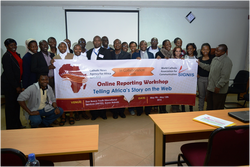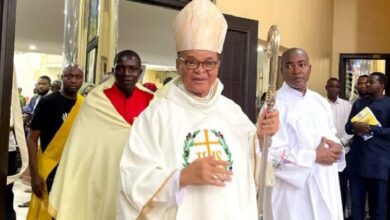Palmer-Buckle urges African Communicators to tell their own stories

Most Rev. Charles Palmer-Buckle, Chairman of the Board of the Catholic News Agency for Africa (CANAA), says that it was time Catholic Journalists on the African Continent strive to make the voice of the Church heard within and beyond its borders.
He lamented that as many prominent media houses seem to focus more on negatives in Africa, a lot of good positive initiatives by the Church and other Religious Institutions go unreported.
“Africa is often times portrayed as a continent of gloom and doom and societal failures of enthnocentricism, violent conflicts, corruption, epidemics like HIV and AIDS and Ebola,” he added.
He said there were many interventions and positive activities of the Church that go unreported and over the years, there had been the desire to share news and other information among the local Churches in Africa.
He made these admonishing during the opening a five-day training workshop for about 30 Catholic Communicators from ten African countries on online reporting about Church activities in Africa at the Don Bosco Youth Educational Services (DBYES) in Karen, Kenya.
It was on the theme: Online reporting: Telling Africa’s story on the Web.
The training from May 9 to 13, was organized by CANAA, a project of the Bishops of Africa under the Symposium of Episcopal Conferences of Africa and Madagascar (SECAM).
Being the first training since CANAA started regular reporting through its biweekly newsletter nearly two years ago, the participants were from Ghana, Nigeria, Malawi, Zambia, Tanzania, Uganda, Kenya, and Sudan including Mr. Damian Avevor, News Editor of The Catholic Standard.
Sponsored by the World Catholic Association for Communications (SIGNIS), it brought together participants from ten African countries, a mix of practicing news reporters and selected social communications students.
Rev. Fr. Chrisantus Ndaga, Director of Communications for the Association of Member Episcopal Conferences in Eastern Africa (AMECEA), who opened the Workshop on behalf of Archbishop Palmer-Buckle, said the Workshop was to further the process of engaging Africans to speak to and about their challenges and successes, telling their own stories.
He said CANAA was launching the training a day after the celebration of the 50th World Communications Day, held on May 8, 2016, on the theme Communication and Mercy: A Fruitful Encounter.
The Archbishop said in explaining the theme, Pope Francis invited Communicators all over the world to reflect on the various ways communication could contribute reconciliation, compassion and healing of wounds between individuals, social groups and peoples.
He stated that “This message resonates well with the raison d’etre of CANAA, particularly when we consider how the means of communication has so often been misused to foster divisions, intolerance, and hatred on our continent, besides spreading a negative image of Africa both within the continent and outside.”
He noted that CANAA existed to promote reconciliation, justice and peace in the fulfillment of its mission of advocating for the respect of human rights and the dignity of the human person and fostered servant leadership in those who share its vision and mission and imbibe its product.
He noted that taking cognizance of the growing numbers of middle-class in Africa and strengthened by the reality of increasing internet connectivity through mobile phones on the continent, the Bishops of Africa had invested in CANAA to help fill the communication gap.
“This communication initiative aims at enhancing a true image and appreciation of the Church in Africa and the best way of realizing this is by engaging Africans in telling their stories.”
Archbishop Palmer-Buckle encouraged the participants to bring their skills to bear and share their experiences in their media practices, saying that the Church has the mission of engaging governments and civil leadership to be at the service of the citizens of this continent.
He told the participants that CANAA needed them to help further its initiative of telling the good news of the Church and of Africa ourselves and to others.
Welcoming the participants, Rev. Fr. Don Bosco Onyalla, Coordinator of CANAA, said the main purpose of the workshop was to “learn how to tell our own stories, speak about our challenges and triumphs, how to report about the great works of God in our respective societies.”
He extended the felicitations of Most Rev. Emmanuel Badejo, Bishop of Oyo Diocese, Chairman of the African Bishops responsible for Communication, to the participants.
There were five facilitators who are actively involved in news writing and editing, engaged the participants in a number of online news reporting topics including “ the ingredients of news; news formats and building the story; content production for web-based media; and web-based news management.”
Others were “telling the African story on the web; addressing an international audience; interviewing skills; the use of audio and video; writing leads, quotations, and transitions; feature writing as well as legal and ethical issues in online news reporting.”
The facilitators were Rev. Fr. Don Bosco Onyalla, Coordinator of CANAA; Rev. Fr. Sebastian Koladiyil, SDB, Director of Don Bosco Eastern African Multimedia Services (BEAMS) at Karen; Mr. Henry Makoli, English Edition Editor of Pambazuka News, a weekly Online Magazine; and Mr. Mike O’maera, a Communication Consultant.
There was an input through a video conference on freelancing and the cultural style differences between African and American publications, facilitated by Ms. Melanie Lidman, Middle East and Africa correspondent for Global Sisters Report (GSR) based in Israel.
By Damian Avevor
